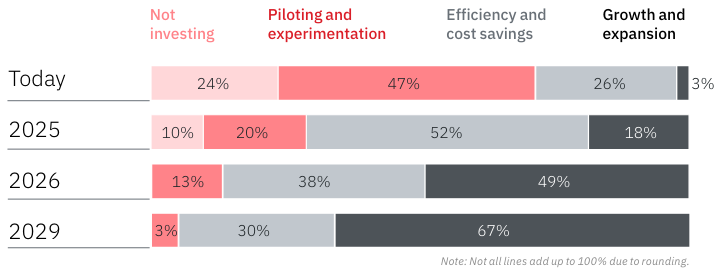
'Canadian business leaders are transitioning from experimentation to integration'

Nearly two in three (64%) of Canadian CEOs believe that competitive advantage depends on having the most advanced generative AI (GenAI) capabilities, according to a report from IBM.
That’s higher than the global average of (59%).
Canadian business leaders have already seen a lot of productivity gains with the use of GenAI, and they are willing to take more risks to jump ahead of the competition.
Overall, 62% say the productivity gains from automation are so great they must accept more risk to stay competitive, and 72% say they will take more risk than the competition to maintain their competitive edge.
"We are at a tipping point with generative AI as Canadian business leaders are transitioning from experimentation to integration that delivers real business impact," said Craig Eaket, managing partner, IBM Consulting Canada. "As with any transformational change, there are challenges but there is also widespread recognition of a tremendous opportunity with AI for increased productivity. The potential business value is extraordinary."
Canada runs the risk of “falling behind” on AI adoption, according to PwC.
Currently, nearly half (47%) of CEOs are piloting and experimenting with GenAI and 26% are using the technology to drive efficiency and cost savings.
Just 3% say GenAI is helping with growth and expansion. That, however, will change in the next few years.
By 2025, 18% of CEOs believe GenAI will drive growth and expansion. That number will jump to 49% in 2026, and to 67% in 2029.

Source: IBM
“CEOs continue to manage that creative tension between having a vision for the organization of the future while still being grounded in the realities of today.” said Ngiam Siew Ying, CEO of Synapxe, according to the report.
Three in four employees across the world are now using GenAI, according to a previous joint report from Microsoft and LinkedIn.
Aside from the productivity gains, GenAI has also led to the creation of new jobs, according to IBM’s survey of more than 2,500 CEOs from more than 30 countries and 26 industries, conducted from December 2023 through April 2024.
More than half (51%) of companies are hiring for generative AI-related roles that didn’t exist last year.
However, more than half also say they’re already struggling to fill key technology roles. Overall, CEOs say 35% of their workforce will require retraining and reskilling over the next three years – up from just 6% in 2021.
Nearly two-thirds say their teams have the skills and knowledge to incorporate generative AI – and 67% say their recruiting and retention efforts deliver the skills and expertise they need to achieve business objectives, even as they face a talent shortage.
A lack of data may be causing this disconnect, with only 44% of CEOs saying they’ve assessed the impact of generative AI on their workforce, according to IBM.
With the changes coming into the world of work, the technology skills gap is becoming a bigger challenge for many employers, according to a previous Robert Half report.
To prepare workers to use GenAI through upskilling, employers must start by “demystifying GenAI for all employees,” according to Pluralsight.
“Make its principles, potential applications, and ethical considerations accessible to everyone. Training programs should not be confined to tech teams but extended across the board, ensuring that each department understands how GenAI can be applied to their specific contexts, both today and in the future,” it said.
“This inclusive approach to upskilling and cross-skilling underscores the message that GenAI is not a niche tool for a select few but a transformative technology that offers advantages across the spectrum of workplace roles.”
Emphasizing hands-on experience, encouraging experimentation, and fostering a culture of continuous learning “will be key in making GenAI an integral part of everyone's toolkit and driving collective innovation and productivity,” it said.
As the “honeymoon phase” (as the World Economic Forum calls it) of GenAI development progresses, employers are regularly given the urgent message that they must train their workforces now to be nimble adopters of tech, or risk being left behind in the “new age of AI.”